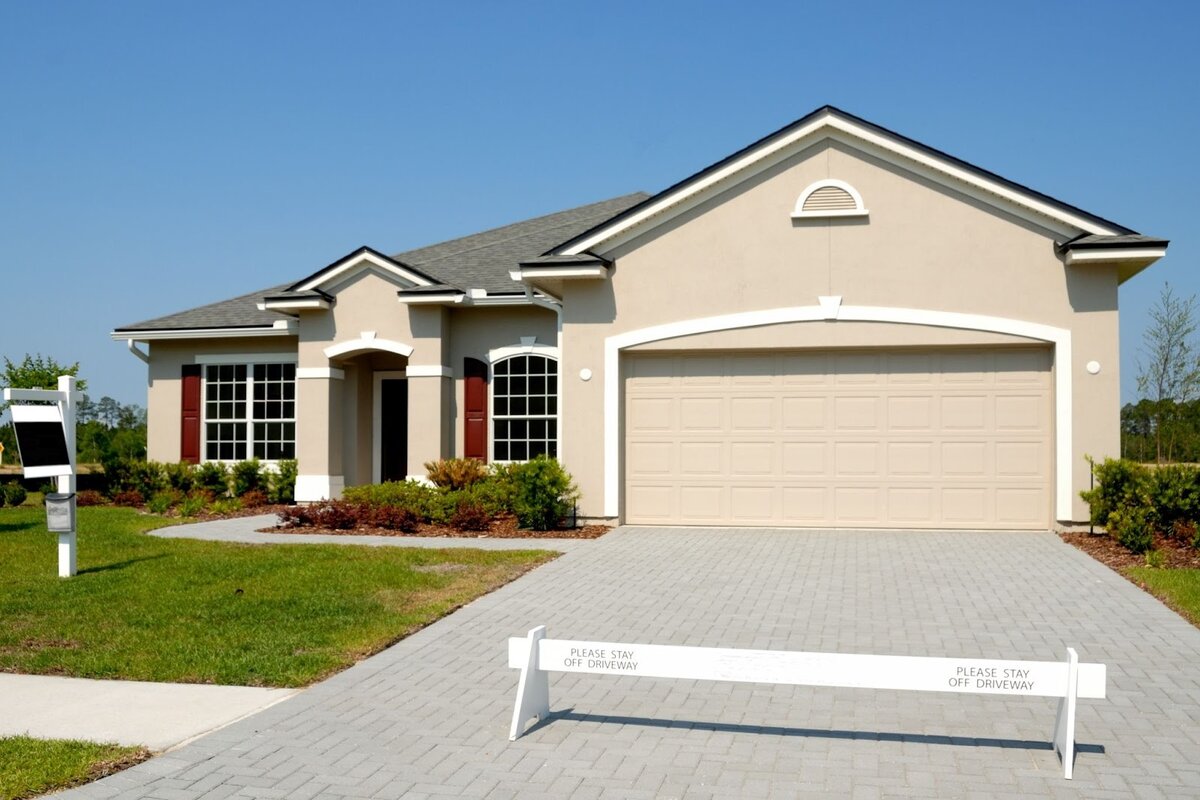
Adding or replacing a driveway is a big decision, but, thankfully, one that comes with lots of options. There are many new and traditional materials to accommodate nearly every budget, taste and use. Let’s take a look at some of those choices to help you decide what kind of driveway is best for you.
In this article:
Important Considerations
When debating what type of driveway is best for you, keep the following in mind. All these factors contribute to your decision, as some options are better for your situation than others.
- How many cars and what size vehicles does your driveway need to support? Some materials hold up better than others under heavy usage.
- How much space do you need for parking, and how long is the driveway?
- How much money can you comfortably spend?
- What are your local building and zoning codes? Most cities and counties require that certain materials be used in driveways.
- What are your geographic location and climate extremes? Some materials perform better under extreme heat or bitter cold.
Different Driveway Types
Different driveways have strengths and weaknesses, whether it’s their ability to handle heavy loads, hold up under extreme weather, or provide a visually pleasing entryway for your property. Here’s an overview of each and their pros and cons.
Asphalt
Average Cost: $4 to $6 per square foot
Lifespan: 12 to 20 years
Asphalt is a popular option with homeowners on a budget or those with long driveways. Asphalt provides a nice, firm, attractive surface and is relatively inexpensive to install. Paved driveways are also quick to install and last long if well-constructed.
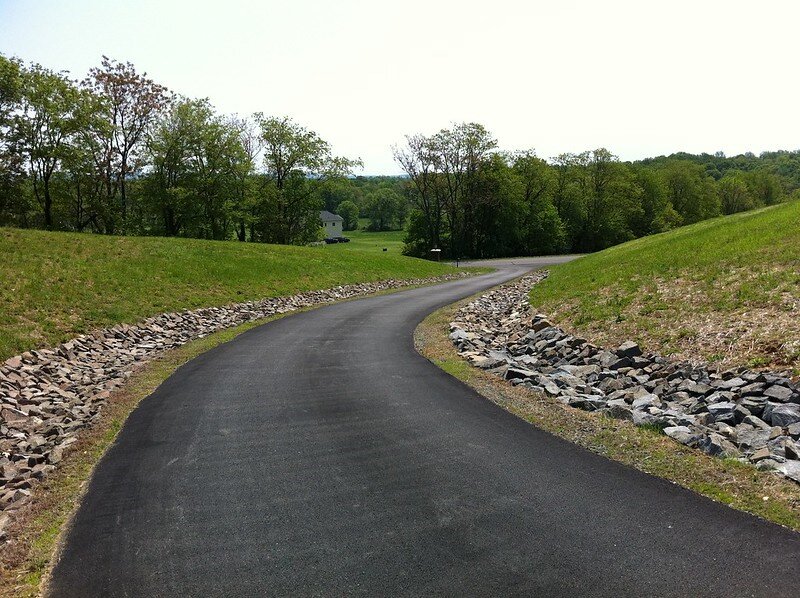
These driveways are best suited for homes in colder climates. They handle freeze-thaw cycles well because they can bend and flex, are easy to plow, and provide excellent tire traction. Dark asphalt also traps and holds heat, so it melts snow quicker than lighter materials.
An asphalt driveway can typically handle in excess of 8,000 pounds, so it accommodates most personal vehicles. (For reference, a Ford F450 dually quad-cab with 4×4 weighs about 8,500 pounds.) Heavier vehicles can cause rutting during the summer or degradation where they regularly park.
You can expect asphalt to last a couple of decades, but it does need regular maintenance. To extend its lifespan, you should reseal it every 3-5 years to fix cracks. A professional contractor will charge $0.17 to $0.24 per square foot, and DIY materials usually cost $50 to $200.
Pros
- Withstands colder climates
- Budget-friendly
- Easy to patch holes and resurface
Cons
- Gets soft and sticky in hot weather
- Needs regular sealing
- Can crack
- One of the least environmentally friendly options
Note: For more information on the cost of asphalt driveways, check out our pricing guide.
Gravel
Average Cost: $1 to $3 per square foot
Lifespan: Up to 100 years
Gravel driveways are attractive options because they are incredibly resilient and cost a fraction of brick or paver driveways. At $1-3 per square foot, they are seen frequently in rural areas with long driveways.
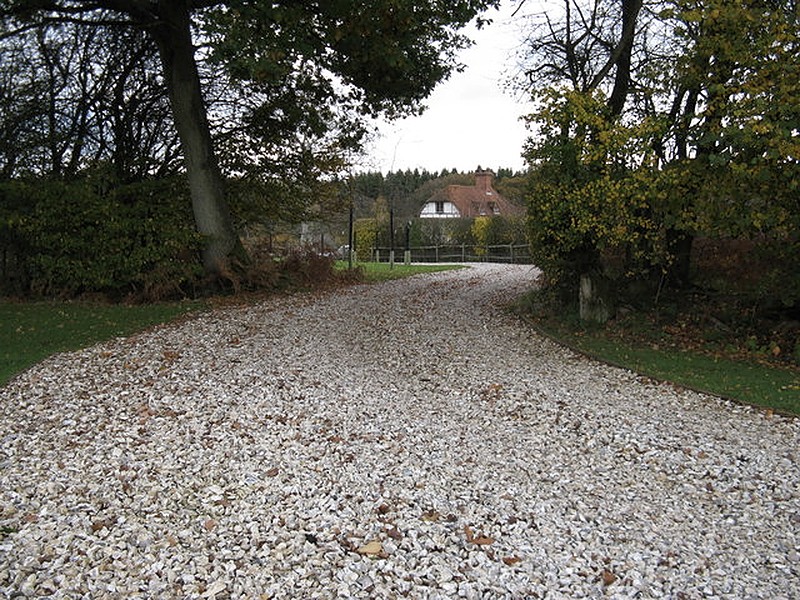
Coming in a range of colors and gravel sizes, gravel can handle many vehicle sizes and weights (gravel is used for many country roads, after all). You can get up to 100 years out of your driveway when installed correctly and maintained properly.
To maintain a gravel driveway, use a sturdy rake or a small tractor with a grader to smooth the surface and fill in potholes, tackle weeds with a non-toxic herbicide (or other weed removal method for gravel), and spread a new inch or two of gravel across the top every few years.
Remember that larger, heavier vehicles can cause ruts and crush gravel quicker than lighter cars.
Pros
- Cheapest material for driveways
- Variety of sizes and color options
- DIY-friendly
- Water permeates through gravel
Cons
- Difficult to remove snow
- Kicks up dust
- Requires regular maintenance
Note: For more information on the cost of gravel driveways, check out our pricing guide.
Concrete
Average Cost: $6 to $16 per square foot
Lifespan: 25 to 50 years
Concrete is the most popular driveway type because it’s low-maintenance and durable. It will not earn compliments like pavers but complements different home designs and offers dependability at a mid-range price.
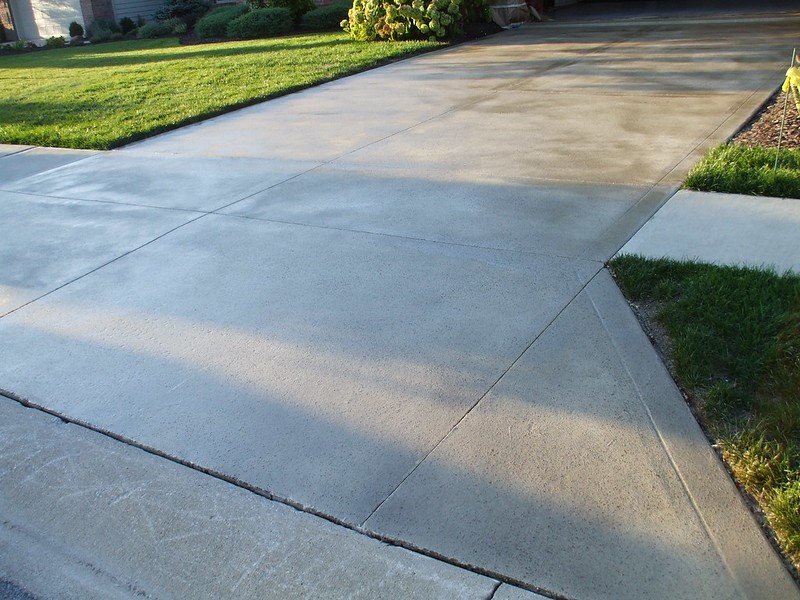
It’s essential to consider your climate when contemplating concrete. These driveways are great for hot climates, as the concrete stays cooler than asphalt and doesn’t get sticky or spongy. Concrete is easy to clear snow from in colder climates, but you may see cracking with freeze/thaw cycles.
You’ll need at least 4” of poured concrete to withstand standard passenger vehicles weighing up to 8,000 pounds. If you regularly plan to have commercial vehicles, a heavy-duty pickup truck, or an RV on your driveway, you will need to pour a thicker slab to prevent damage.
A well-installed concrete driveway will last 30-50 years if well cared for.
To maintain concrete, pressure wash it every couple of months and seal the surface every four or five years. Driveway sealing increases the lifespan of your driveway and adds to your curb appeal. The average cost of driveway sealing is $305.
Pros
- Easy to maintain
- Does well in hot climates
- Complements many home styles
Cons
- It can stain pretty easily
- Can crack with frequent freeze/thaw cycles
- Hard to hide repairs
Note: For more information on the cost of concrete driveways, check out our pricing guide.
Stamped Concrete
Average Cost: $9 to $16 per square foot
Lifespan: 25 to 50 years
Stamped concrete driveways offer the same durability and longevity as concrete and give you the aesthetic appeal of pavers at a lower cost. They are available in different colors and stamp patterns, but the extra installation efforts increase the price per square foot.
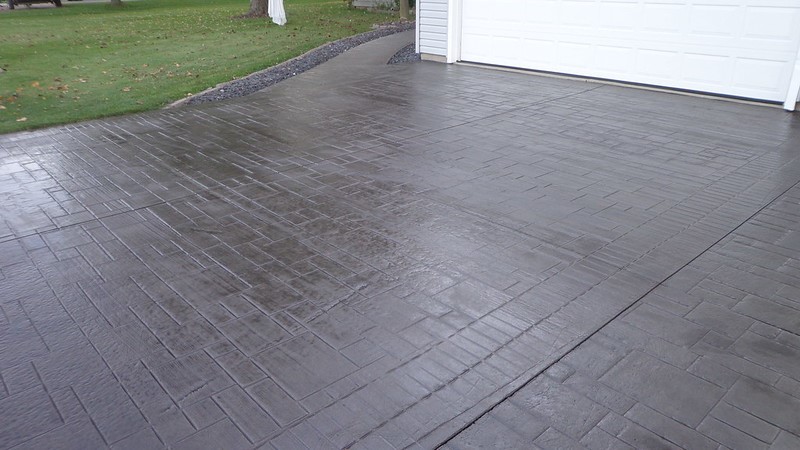
Concrete driveways are typically poured 4″ thick, giving the driveway enough strength to withstand approximately 8,000 lbs. If you regularly plan to have commercial vehicles, a heavy-duty pickup truck, or an RV on your driveway, you will need to pour a thicker slab to prevent damage.
Like a standard poured concrete driveway, you can expect your stamped concrete driveway to last 25 to 50 years when installed properly and well cared for.
Maintenance costs are quite low. For maintenance, stamped concrete requires an occasional pressure wash every couple of months and sealing every four or five years. Driveway sealing increases the lifespan of your driveway and adds to your curb appeal. The average cost of driveway sealing is $305.
Pros
- Numerous customization options
- Performs well in different climates
- Less expensive than brick or pavers
Cons
- Prone to cracking in cold climates
- Difficult to repair
- Stamped effects fade over time
Note: Check out our pricing guide for more information on the cost of stamped concrete driveways.
Stone Pavers
Average Cost: $10 to $30 per square foot
Lifespan: 40+ years
A paver driveway is a more expensive option, but they last a long time and have a high-end look. The variety of material options and installation patterns creates a driveway that looks like an extension of your home, blending in with the aesthetic versus looking like an afterthought.
They are one of the few driveway options that you can turn into a DIY project or hire professional contractors to install. Natural stone pavers are easy to install and don’t require any motorized equipment. The process is tedious, so expect to invest at least a weekend, if not longer, depending on your driveway’s size.
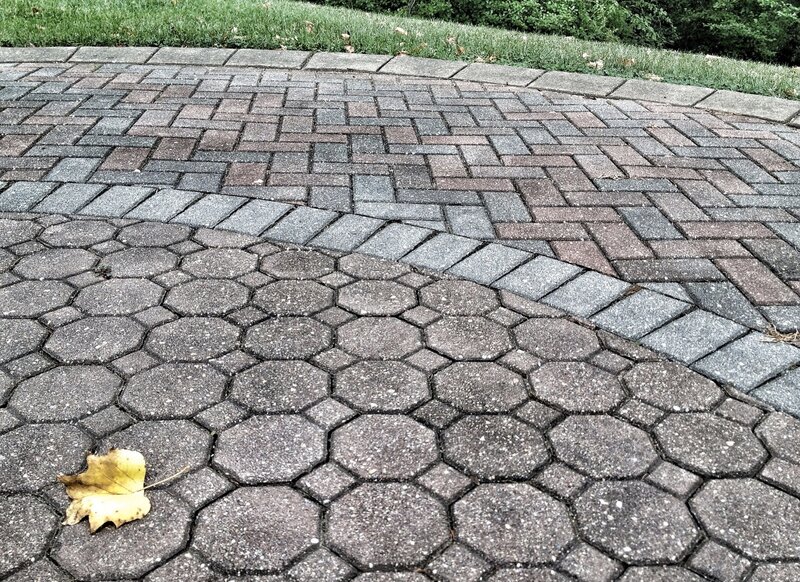
Paving stones are about four times stronger than poured concrete. Before the material fails, it can withstand approximately 8,000-9,000 pounds of pressure per square inch. The individual pieces also make them more flexible and accommodating of freeze/thaw cycles, so they don’t crack easily. If they break, replacing a single paver is relatively easy.
The lifespan of your paver driveway depends on the material type. You can expect interlocking concrete pavers to last upwards of 40 years. Cobblestone pavers can last up to 100 years if properly cared for.
Maintenance is similar to poured or stamped concrete. Pressure wash the pavers every couple of months and seal them every few years to improve their lifespan. The average cost of driveway sealing is $305.
Pros
- Extensive design options
- Low-maintenance
- Long-lasting
- Increases resale value
- Doesn’t need heavy equipment for installation
Cons
- Installation is expensive and labor-intensive
- Weeds grow through cracks
- Hard to shovel snow
Note: For more information on the cost of paver driveways, check out our pricing guide.
Crushed-Shell
Average Cost: $0.50 to $4 per square foot
Lifespan: 3 to 5 years
Crushed-shell is an alternative, cost-effective driveway option. In off-white, gray, or brown, you can choose from different renewable options—oyster, clam, and scallop. It is an eco-friendly driveway as long as the shells are responsibly sourced.
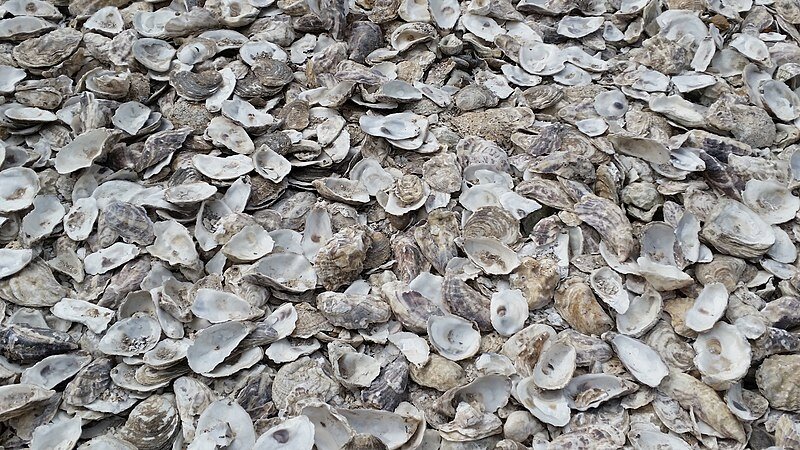
This type of driveway is a more popular choice in coastal areas due to the ease of getting shells. The porous surface drains well and isn’t prone to some of the problems you see with gravel. As the shells are driven over, they break into smaller pieces and disperse evenly, creating a strong, stable surface. You don’t see ruts or holes like crushed stone.
It will handle typical driveway traffic and the standard weight of personal vehicles.
There is little maintenance needed with a crushed-shell driveway. They tend to self-level and drain water well. However, as the shells break into smaller pieces, you may want to replenish the shells every few years, especially if you like the look of larger pieces.
Pros
- Environmentally-friendly
- Has excellent drainage
- Not prone to ruts or holes
Cons
- Shorter lifespan
- Sharp edges are painful for bare feet
- Not readily available everywhere
- Snow removal difficult
Brick
Average Cost: $10 to $30 per square foot
Lifespan: 25+ years
Brick driveways are similar to stone pavers and are commonly seen installed at historic homes. This driveway material is nearly indestructible, so it has a great lifespan and doesn’t require much maintenance. The big drawback is that this high-end look has a higher material and installation cost.
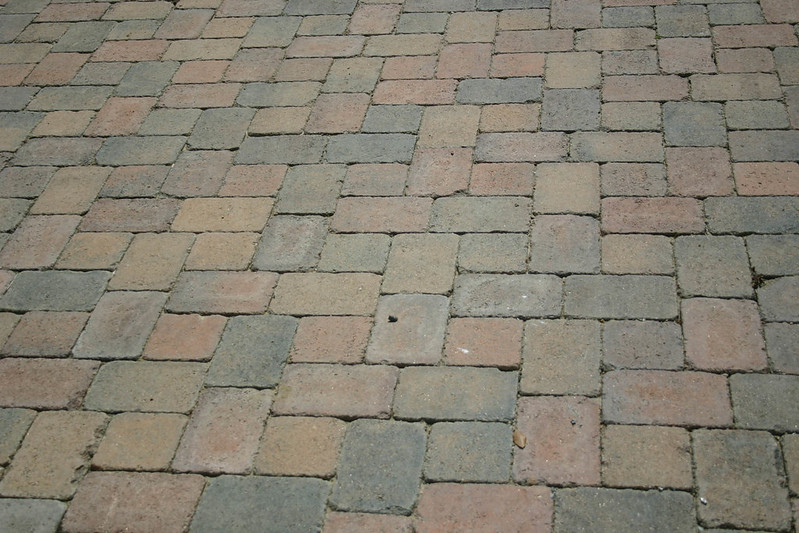
Like stone pavers, the individual bricks make the driveway more flexible and accommodate freeze/thaw cycles. They don’t crack easily, and if they do, or if they heave from frost, it’s relatively easy to replace a single brick.
These driveways have as much as 15,000 pounds per square inch weight capacity, making them one of the strongest materials on our list. This capacity is more than enough to handle your own 5,000-7,000 pound vehicle.
A well-installed brick driveway will easily last more than 25 years under everyday use. In mild climates, your driveway may last longer.
Brick driveways require pressure washing every couple of months and sealing every four or five years. Driveway sealing increases the lifespan of your driveway and adds to your curb appeal. The average cost of driveway sealing is $305.
Pros
- Extremely durable in all weather conditions
- Single bricks can be easily replaced
- Classic, high-end look
- Doesn’t require heavy equipment for installation
Cons
- May loosen or shift over time
- Fewer customization options than pavers
- Expensive to purchase and install
Permeable Pavers
Average Cost: $20 to $40 per square foot
Lifespan: 25 to 30 years
Permeable pavers are a newer driveway technology quickly gaining popularity with homeowners. The pavers are designed with engineered holes to let water flow easily through them to the ground below. This water movement helps improve stormwater drainage, which is environmentally beneficial.
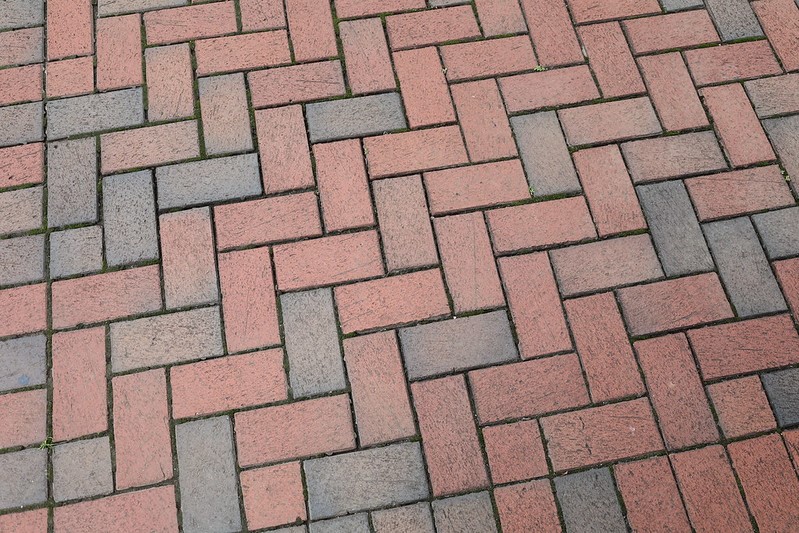
Since this material is made from high-density polyethylene (HDPE) and often contains UV inhibitors, they withstand both hot and cold climates.
These engineered permeable pavers have a compression strength of about 8,000 pounds per square inch, comparable to stone pavers. Therefore, it should easily handle standard driveway traffic without experiencing cracks or damage.
This type of driveway has similar longevity to concrete and lasts about 25 to 30 years with regular upkeep. Because of the open nature of the surfaces, permeable pavers clog with sediment and debris over time, decreasing the infiltration rate. This debris and sediment need to be vacuumed or removed every 6-12 months, depending on severity, to maintain permeability and water flow. There isn’t a high cost with this maintenance if you DIY.
Pros
- Water permeable
- Holds less heat than asphalt or concrete
Cons
- Not great for clay soil
- Expensive
- Higher maintenance
- Accumulates snow
Grass
Average Cost: $4 to $6 per square foot
Lifespan: 20 to 30 years
When we talk about grass driveways in this article, it’s not the straightforward grass drive we think of but a combination system that integrates permeable grids or concrete blocks with grass. The resulting driveway is beautiful and aesthetically pleasing.
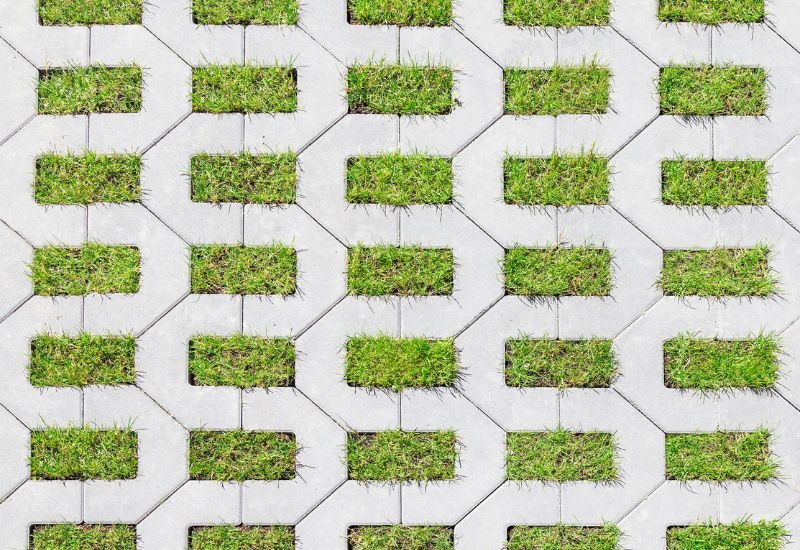
Plastic interlocking grids or concrete pavers are laid on top of a rock base, and the grass is encouraged to grow between the pieces. The supporting components prevent the grass from being compacted and killed, and the stormwater runoff can quickly drain back into the ground.
This driveway type is better suited to humid, warm climates where the grass will stay green year-round. The compression strength depends on the support structure and is equivalent to permeable or stone pavers.
You can expect your grass driveway to last 20-30 years.
To take care of it, cut and water the grass as you would with any other lawn. There is little maintenance beyond this. If there is an issue, the interlocking grid or concrete piece is quite simple to replace.
Pros
- Visually interesting
- Water permeable
- Environmentally-friendly
Cons
- Not great for cold or dry climates
- Must be regularly trimmed
- Not an even surface
How Much Value Does a Driveway Add to Your Home?
On average, you can expect a quality driveway to add 5% to 10% to your home’s value. How much it adds depends on the type of driveway installed and whether or not the installation is needed.
Higher-end options will add more value than gravel, but if you have a small property or adequate free parking close to your home, you may not see any value increase.
FAQ
The best time to install a driveway depends on the type. Asphalt and concrete are best poured when temperatures are above 70°F, although you can pour them as low as 50°F. Other driveways have more leeway and can be installed whenever the weather is conducive.
Residential asphalt driveways are typically installed 2 to 4 inches thick for standard vehicle traffic. You can install asphalt up to 6” deep if you have occasional large trucks or heavy equipment driving on it. Underneath the asphalt, you should have 6-8 ” of base aggregate.
Homeowners in cold climates should consider getting a concrete driveway with a heating system. Heated driveways cost extra, with a typical 2-car concrete driveway with radiant heat costing $4,860 – $12,480.
It depends on the condition of your current asphalt driveway. Since it is an adaptive material, resurfacing your asphalt is more cost-effective than completely replacing it. If your driveway has considerable damage affecting its durability and integrity, it should be replaced.
Installing a new driveway is a considerably large, labor-intensive project, depending on the type of driveway and its size. Professionals typically install asphalt and concrete driveways, but you can DIY brick, stone pavers, and even gravel driveways if you’re dedicated to the project.
Need Assistance?
If you’re ready to upgrade the curb appeal of your driveway but aren’t interested in tackling this home improvement project yourself, contact one of our installation specialists to get a quote for a driveway installation.
Main Photo by: Rawpixel